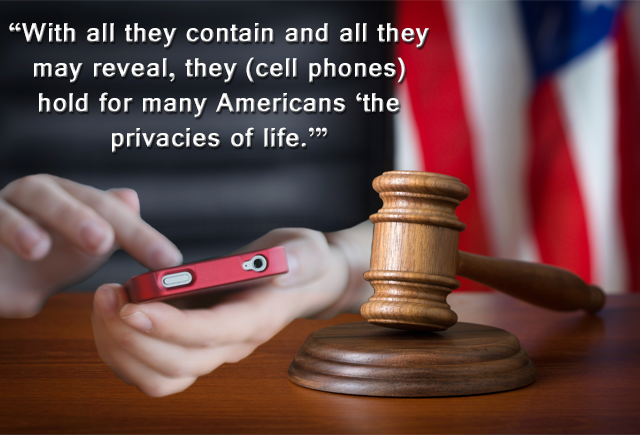
In State v. McKee, the WA Court of Appeals held that a search warrant that authorized the police to search and seize a large amount of cell phone data, including images, video, documents, text messages, contacts, audio recordings, call logs, calendars, notes, and tasks, and authorized a “physical dump” of “the memory of the phone for examination,” violated the particularity requirement of the Fourth Amendment.
BACKGROUND FACTS
In 2012, A.Z. lived with her older brother and her mother in Anacortes. All parties were addicted to heroin, methamphetamine or both. A.Z. was using heroin and methamphetamine on a daily basis during 2012.
In January 2012, A.Z.’s mother introduced A.Z. to 40-year-old Marc Daniel McKee during a “drug deal” for methamphetamine. McKee started spending a lot of time with the family and supplied them with methamphetamine. They would often “get high” together. At the end of June, McKee left to go to Alaska for work.
When McKee returned two months later, he immediately contacted A.Z. McKee told A.Z. he had heroin and methamphetamine. McKee and A.Z. spent three days together at a Burlington motel using the drugs and engaging in consensual sex.
Eventually, A.Z’s mother confronted McKee about the sexual encounters between A.Z. and McKee. Bringing another male with her A.Z.’s mother confronted McKee at a hotel room, beat him up, took his cell phone, and pulled A.Z out of the room. Later, A.Z.’s mother scrolled through the phone. She found pictures and videos of her daughter A.Z tied naked to a bed as well as videos of McKee and A.Z. having sex.
After A.Z.’s mother looked at the video clips and photographs on the cell phone, she contacted the Mount Vernon Police Department. On October 30, A.Z.’s mother met with Detective Dave Shackleton. A.Z.’s mother described the video clips and photographs she saw on the cell phone. She left the cell phone with Detective Shackleton. Later, A.Z.’s mother contacted Detective Shackleton to report that J.P., another minor female, told her that McKee gave J.P. drugs in exchange for sex. Brickley obtained a restraining order prohibiting McKee from contacting A.Z.
Application for a Search Warrant
On October 31, Detective Jerrad Ely submitted an application and affidavit (Affidavit) in support of probable cause to obtain a warrant to search McKee’s cell phone to investigate the crimes of “Sexual Exploitation of a Minor RCW 9.68A.040” and “Dealing in Depictions of a Minor Engaged in Sexually Explicit Conduct RCW 9.68A.050.” The court issued a search warrant.
The warrant allowed the police to obtain evidence from the cell phone described as an LG cell phone with model VX9100 currently being held at the Mount Vernon Police Department for the following items wanted:
“Images, video, documents, text messages, contacts, audio recordings, call logs, calendars, notes, tasks, data/internet usage, any and all identifying data, and any other electronic data from the cell phone showing evidence of the above listed crimes.”
The search warrant authorizes the police to conduct a “physical dump” of the memory of
the cell phone for examination. On November 7, 2012, the court filed a “Receipt of Execution of Search Warrant.” The Receipt of Execution of Search Warrant states the police conducted a “Cellebrite Dump” of the cell phone on November 6. Cellebrite software obtains all information saved on the cell phone as well as deleted information and transfers the data from the cell phone to a computer.
Criminal Charges
The State charged McKee with three counts of Possession of Depictions of Minors Engaged in Sexually Explicit Conduct in the First Degree in violation of RCW 9.68A.070(1) based on the three cell phone video clips, one count of Possession of Depictions of a Minor Engaged in Sexually Explicit Conduct in the Second Degree in violation of RCW 9.68A.070(2) based on the cell phone photographs, one count of Commercial Sex Abuse of J.P. as a minor in violation of RCW 9.68A.100, three counts of Distribution of Methamphetamine and/or Heroin to a person under age 18 in violation of RCW 69.50.406(1) and .401(2), and one count of Violation of a No-Contact Order in violation of RCW 26.50.110(1).
Motion to Suppress
McKee filed a motion to suppress the evidence the police seized from his cell phone. McKee asserted the search warrant violated the Fourth Amendment requirement to describe with particularity the “things to be seized.” McKee argued the warrant allowed the police to search an “overbroad list of items” unrelated to the identified crimes under investigation. McKee also argued probable cause did not support issuing a search warrant of the cell phone for the crime of dealing in depictions of a minor engaged in sexually explicit conduct.
The court entered an order denying the motion to suppress. The court found the allegations in the Affidavit supported probable cause that McKee committed the crimes of sexual exploitation of a minor and dealing in depictions of minors engaged in sexually explicit conduct. The court concluded the citation to the criminal statutes established particularity and the search warrant was not overbroad.
At trial, the jury found McKee not guilty of distribution of methamphetamine and/or heroin. The jury found McKee guilty as charged on all other counts.
COURT’S ANALYSIS & CONCLUSIONS
Ultimately, the Court of Appeals held that the search warrant violated the particularity requirement of the Fourth Amendment, and that a search conducted pursuant to a warrant that fails to conform to the particularity requirement of the Fourth Amendment is unconstitutional.
The Court reasoned that the Fourth Amendment was adopted in response to indiscriminate searches and seizures conducted under the authority of ‘general warrants.’
“The problem posed by the general warrant is not that of intrusion per se, but of a general,
exploratory rummaging in a person’s belongings,” said the Court. “The Fourth Amendment
addresses the problem by requiring a particular description of the things to be seized . . .
The court further reasoned that by limiting the authorization to search to the specific areas and things for which there is probable cause to search, the requirement ensures that the search will be carefully tailored to its justifications, and would not take on the character of the wide-ranging exploratory searches the Framers of the Constitution intended to prohibit.
“The degree of specificity required varies depending on the circumstances of the case and the types of items,” said the Court. “The advent of devices such as cell phones that store vast amounts of personal information makes the particularity requirement of the Fourth Amendment that much more important.” The Court also quoted language from the U.S. Supreme Court’s Riley v. California and the WA Supreme Court’s State v. Samilia; both cases strongly supporting the notion that cell phones and the information contained therein are private affairs because they may contain intimate details about individuals’ lives.
“Here, the warrant cites and identifies the crimes under investigation but does not use the language in the statutes to describe the data sought from the cell phone,” said the Court. “The warrant lists the crimes under investigation on page one but separately lists the “Items Wanted” on page two.” Consequently, the Court reasoned that the description of the “Items Wanted” was overbroad and allowed the police to search and seize lawful data when the warrant could have been made more particular.
Furthermore, the Court held that the warrant in this case was not carefully tailored to the justification to search and was not limited to data for which there was probable cause. The warrant authorized the police to search all images, videos, documents, calendars, text messages, data, Internet usage, and “any other electronic data” and to conduct a “physical dump” of “all of the memory of the phone for examination.”
“The language of the search warrant clearly allows search and seizure of data without regard to whether the data is connected to the crime,” said the Court. “The warrant gives the police the right to search the contents of the cell phone and seize private information with no temporal or other limitation.” As a result, reasoned the Court, there was no limit on the topics of information for which the police could search. Nor did the warrant limit the search to information generated close in time to incidents for which the police had probable cause:
“The warrant allowed the police to search general categories of data on the cell phone with no objective standard or guidance to the police executing the warrant. The language of the search warrant left to the discretion of the police what to seize.”
With that, the Court of Appeals held the search warrant violated the particularity requirement of the Fourth Amendment. The Court reversed and dismissed the four convictions of Possession of Depictions of a Minor Engaging in Sexually Explicit Conduct.
My opinion? For the most part, courts look dis favorably on the searches of people’s homes, cars, phones, etc., unless the probable cause for the search is virtually overwhelming, and/or an emergency exists which would spoil the evidence if it was not gathered quickly; and/or a search warrant exists. Even when search warrants are drafted and executed, they must be particular to the search. In other words, law enforcement can’t expect that a general, non-specific search warrant is going to win the day for them and allow a fishing expedition to take place.
Here, the Court of Appeals correctly followed the law. In this case, limiting the search to the crimes cited on the first page of the warrant was insufficient. The descriptions of what to be seized must be made more particular by using the precise statutory language to describe the materials sought.
Please read my Search and Seizure Legal Guide and contact my office if you, a friend or family member’s person, home, vehicle or cell phone was searched by police and evidence was seized. The search may have been unlawfully conducted in violation of your Constitutional rights.













